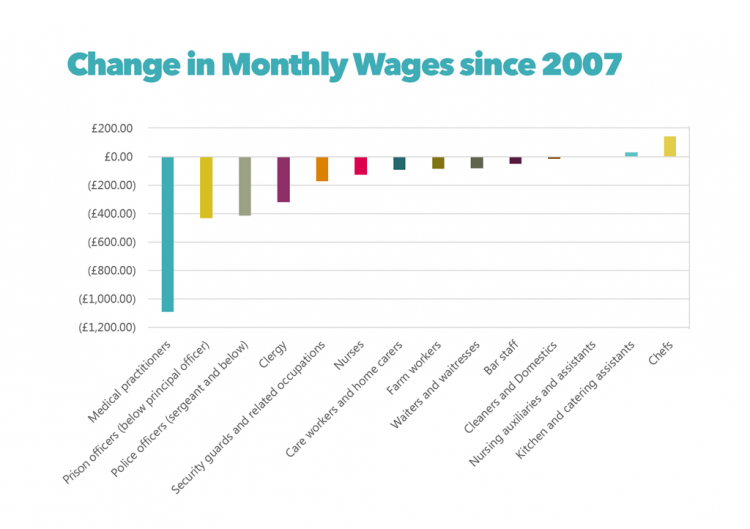
Working in a winter wonderland?
As church bells ring Christmas morning, vicars, priests and ministers will welcome millions to services on Christmas morning. Come lunchtime waiters, waitresses and bar staff will work tirelessly to provide yuletide food and drink. All through the day, carers will be ensuring that everyone who needs care gets it. And in hospitals across the country, doctors, nurses and nursing assistants will be on hand to help those for whom illness or injury mars the special day.
Real wages have fallen
Most of us would expect that those who give up their Christmas day so we can enjoy ours should be well rewarded for their time.
But analysis carried out by the TUC has revealed that this isn’t the case. Most Christmas workers will be poorer this year than they were a decade ago. Using the Government’s Annual Survey of Hours and Earnings, we looked at how the mean average wages of Christmas workers have changed over the past 10 years. We then took into account how the rising cost of living has reduced the value of wages since over that period.

We found that wages in real terms have fallen for 12 of the 14 jobs with the highest numbers of Christmas workers over the past 10 years. Unsurprisingly, victims of the government’s public sector pay cap have been hit the hardest, with medical practitioners, prison officers and police officers suffering from the biggest real terms pay cuts. Nurses have also seen their earnings drop by £29 a week. Shamefully, falling pay is leaving some nurses reliant on food banks or even at risk of becoming homeless.
But Christmas workers in the private sector are struggling as well. The average carer is having to get by on £286 a week- a squeeze of £21 over the last 10 years. More than half of carers earn even less than that. For some, the situation is even worse. The government recently decision suspended the enforcement of the minimum wage for carers staying overnight. That means some bosses will be getting away with paying workers less than the minimum wage. That could leave some carers be struggling to afford basics, let alone luxuries this Christmas.
Falling wages will be particularly damaging for workers in low-paid occupations such as cleaners, bar staff and waiters and waitresses. Bar staff now earn just £701 a month, compared to £752 a decade ago. Over the past decade, waiters and waitresses have seen weekly earnings in real terms fall from £171 to £152.
While it’s good news that chefs and kitchen assistants are seeing their monthly earnings rise, their wages still lag behind those of most workers. Chefs earn on average £378 a week, £160 less than what the average worker in the UK earns (£589). Kitchen assistants earn just £200 a week, well under half the national average.
Pay is set to carry on falling
And rising wages are the exception. According to the OECD, in 2018, the UK’s real wage growth will be the worst amongst any advanced economy. With real wages falling across the economy, it’s no surprise that the clergy have taken a hit. With the earnings of church members falling, they’ll have less money left to put in the collection plate, making it increasingly difficult to pay church workers a decent wage.
Despite a decade passing since the start of the recession, wages still haven’t recovered. We may even have to wait until 2025 to see pay reach pre-crisis levels. That is unacceptable. The government must scrap the public sector pay cap and prioritise action to push up private sector wages.
Image: Thomas Northcut
Stay Updated
Want to hear about our latest news and blogs?
Sign up now to get it straight to your inbox
